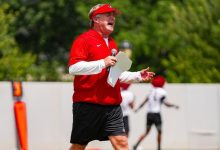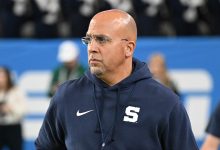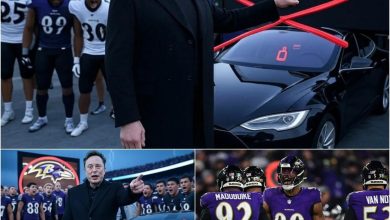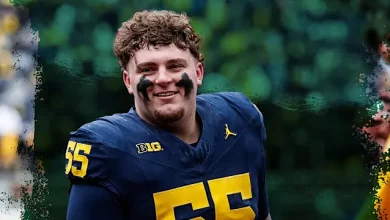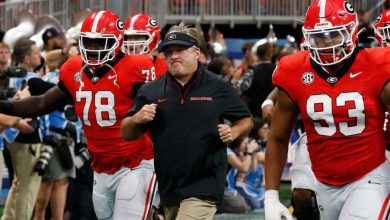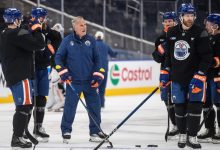A year ago today, Mark Pope was officially introduced as the head coach of the Kentucky Wildcats during a momentous press conference.
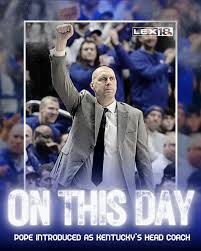
One year ago, Mark Pope stood behind a podium inside Rupp Arena and accepted the job of a lifetime: becoming the head coach of the University of Kentucky men’s basketball program. It was a moment that blended deep nostalgia with bold ambition, where Pope—a captain on the Wildcats’ 1996 national championship team—returned home not as a former player, but as the leader of the most storied program in college basketball.
What followed over the next 12 months was a whirlwind of transition, rebuilding, culture-setting, and a relentless push to restore Kentucky basketball to the level its fans demand and its tradition demands. Today, a year after that momentous press conference, the program sits at a turning point—no longer simply reacting to change, but actively embracing a new identity under Pope’s leadership.
A Moment That Meant More
Pope’s introductory press conference on that spring day wasn’t just another announcement—it was a ceremony. Accompanied by several members of the iconic 1996 championship team, Pope walked out to thunderous applause, hoisting a replica of the national title trophy he once helped secure as a player. It was a symbolic passing of the torch—not just from one generation to the next, but from player to coach, from memory to mission.
But the fanfare was just the backdrop. Pope wasted no time laying out a vision that was both unapologetic and crystal clear. “It’s Kentucky,” he said with conviction. “I’m not going to be the guy who comes in here and lowers expectations. We’re trying to win this whole thing.”
Those words reverberated across Big Blue Nation, signaling a culture shift rooted not in rebuilding modestly, but in restoring relentlessly.
The Fallout and the Fresh Start
Mark Pope was hired following a tense and dramatic departure of former head coach John Calipari, whose time at Kentucky had grown increasingly divisive after several early NCAA Tournament exits and an inability to return to the Final Four. For many, Pope’s hiring was met with both hope and uncertainty. Could a former Wildcat who had never coached a Power Five team meet the pressure-cooker demands of Kentucky basketball?
In his first weeks on the job, Pope immediately set out to prove that he wasn’t daunted by the challenge. He embraced the program’s rich history, consistently referring to it as the “greatest job in college basketball,” while acknowledging the program’s recent struggles and pledging to raise the standard. His message was clear: the bar was still set at championships.
What made Pope’s early messaging resonate was his refusal to hide from the past. “We failed at our job last year,” he said, referencing the team’s first-round loss to 14-seed Oakland in the NCAA Tournament. That level of transparency—especially in a sport dominated by excuses and spin—was refreshing.
Building a Team and a Culture
In the modern college basketball landscape, rebuilding isn’t just about high school recruiting—it’s about navigating the transfer portal, NIL dynamics, and player retention. Pope embraced all of it.
He prioritized a roster that blended experience with upside, pursuing proven college players who fit his system and mindset. While Kentucky fans had grown used to rosters filled with five-star freshmen under Calipari, Pope’s approach focused more on chemistry, shooting, and toughness—characteristics that have defined recent national champions.
In assembling his first team, Pope placed a premium on players who wanted to be part of something bigger. He wasn’t just collecting talent; he was curating competitors. And along the way, he communicated consistently with fans, taking time to explain his decisions, welcome supporters into the process, and reaffirm his vision.
The result was a roster that, while different from Kentucky teams of the recent past, began to reflect the principles Pope had championed: selflessness, grit, discipline, and a shared hunger for success.
Reconnecting with the Fanbase
Perhaps Pope’s most overlooked strength has been his ability to reconnect the Kentucky program with its fanbase on a personal level. Whether through social media messages, community events, or his charismatic presence at games and pressers, Pope quickly reestablished a bond between the head coach’s office and Big Blue Nation.
He knew from experience how much the program means to the state—how every game is a state-wide event, how every win or loss impacts people’s weeks. That knowledge gave Pope a unique platform to speak not just to fans, but for them. He celebrated Kentucky’s history without sounding dated, and embraced modern challenges without making excuses.
By the time his first season was underway, Pope had already reminded fans of something many feared was lost: Kentucky basketball isn’t just about who plays; it’s about who leads—and how.
On-Court Identity Taking Shape
In his first season on the court, Pope faced the realities of a transition year—blending new players, installing new systems, and competing in an increasingly competitive SEC. But despite the challenges, his team began to show flashes of what Pope envisioned: smart ball movement, consistent shooting, and tough-nosed defense.
There were ups and downs, as expected, but the foundational identity of a Pope-coached Kentucky team began to crystallize. His teams were disciplined, fundamentally sound, and capable of withstanding adversity. While they may not have won every game, they played with a purpose and togetherness that bodes well for the future.
In postgame press conferences, Pope continued to hold the program to a high standard—never overreacting to wins or rationalizing away losses. It’s part of the accountability-first culture he’s establishing: one where process and performance are constantly evaluated against the championship benchmark.
The Weight and Gift of Expectations
In every interaction, Pope has made it clear that he understands the stakes. Coaching Kentucky isn’t just about basketball—it’s about legacy, identity, and pressure. But instead of shying away from that reality, he embraces it.
“Expectations are a gift,” Pope said. “There are programs across the country where just making the tournament is enough. That’s not who we are. We wake up every day knowing we’re supposed to be the best. That’s why this place is special.”
It’s this mindset that has already begun to permeate the program. From how players approach practice to how fans engage with the team, there’s a growing belief that the next chapter of Kentucky basketball might not only be different—it might be triumphant.
Looking Ahead: Year Two and Beyond
As Pope enters his second year at the helm, he does so with a stronger foundation and a clearer vision. The roster is being fine-tuned to reflect his style, the staff has gelled, and the program’s cultural reset is well underway.
There’s work to be done, of course. Kentucky still faces the pressure of turning potential into production. They still need to advance deep into March and return to the Final Four to satisfy the cravings of their title-hungry fans. But the direction feels right, and the leadership feels trustworthy.
Recruiting has picked up, the practice gym now displays only championship banners as a daily reminder of the ultimate goal, and Pope’s players speak with the kind of belief and intensity that reflect their coach’s influence.
Final Thoughts: A Year That Matters
A year ago, Mark Pope stepped to the microphone and made a promise—not just to win, but to honor what Kentucky basketball stands for. Twelve months later, he’s backed up those words with action, effort, and authenticity.
He hasn’t just taken a job—he’s embraced a mission. And while banners aren’t hung for press conferences or cultural rebuilds, the foundation he’s laying could be what brings Kentucky basketball back to where it belongs: cutting nets in April, not just making noise in November.
For a program steeped in tradition, sometimes the best way to move forward is to reconnect with what made it great in the first place. Mark Pope understands that better than most. And now, a year into his tenure, it’s clear: this is just the beginning.

